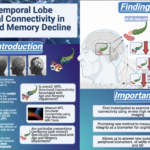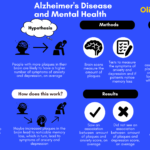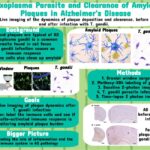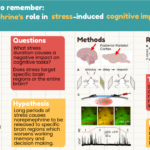3rd Annual Irvine Brain Bee goes VIRTUAL!
Written by Jaclyn Beck
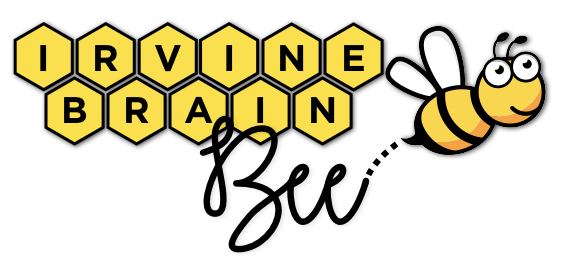
On March 20, 2021, more than 40 high school students joined the UC Irvine Center for the Neurobiology of Learning and Memory (CNLM) Brain Bee via Zoom to learn about the brain. In years prior, the Brain Bee had a written exam and a lab practicum, followed by a final show-down among the top 10 contestants. With everything going virtual this year, Brain Bee organizers decided to create a Zoom-friendly version of the competition that was filled with facts, fun, and friendly competition.
“The annual Irvine Brain Bee is such an interactive, involved event. We knew bringing that same level of excitement to an online venue was going to be a challenge. But the brain bee committee, poster presenters, and of course the motivated high school participants did a phenomenal job adapting to the virtual environment. We brought in some new elements this year to replace some less zoom-friendly parts of the Brain Bee, but I think these could make a wonderful additional to our traditional annual event.” – Rachael Hokenson, Brain Bee Committee co-chair.
New to the event this year: a virtual poster session led by UC Irvine graduate students Olivia Bernstein, Aby Flores, Steve Granger, and Julia Tomasello. The four presenters made infographics of their original research specifically for the Brain Bee, and talked about their work on stress, Alzheimer’s disease, depression, anxiety, and brain parasites! The poster session gave Brain Bee participants a taste of the wide variety of topics that neuroscientists study and provided the opportunity for meaningful engagement with graduate students. For the aspiring scientists in the group, it showed what they could be working on in just a few short years.
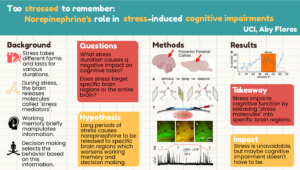
An infographic presented at the 2021 Virtual Brain Bee
Students also participated in five interactive learning sessions led by UCI graduate students and postdocs. Postdoctoral Fellow Dr. Sarah Kark took students on a virtual tour of a real human brain. Students also learned how neurons use electrical signals to control muscles, in the best way possible: session leaders hooked themselves up to a Muscle SpikerBox (Backyard Brains) and controlled either a claw or each other by flexing their own muscles. Students also learned about optical illusions and other brain “tricks,” and played memory games to see how short term memory works. Lastly, they experimented in a virtual lab, recording simulated neuron activity from a leech to learn how different neurons respond to touch.
The keynote speech was given by UCI’s own Dr. Craig Stark. This was Dr. Stark’s 100th talk, and it was an exciting one. He spoke about his work researching how and why our memory gets worse with age. He noted that as we get older, our brains start to lose white matter, the information highways between neurons. But Brain Bee students were delighted to hear one of Dr. Stark’s potential solutions to this problem: video games! “Most labs here are doing complex experiments, and I’m having people play Angry Birds,” he joked. He talked about several studies showing that regularly playing a video game can help improve memory in older adults. The important thing, he stressed, is that the game needs to have some sort of exploration, building, or learning component to it. Several of the students were no doubt happy to be able to use this as a reason to play more video games.
The Brain Bee wrapped up with a friendly brain trivia competition, with participants entering their answers remotely and competing for prizes. First place winners from each of the four rounds were Tanush Paradeshi, Sophia Chen, Aditya Mittal, and Aryan Pandley. Second place winners were Siddhant Karmali, Geoffrey Zhang, Kayla Roh, and Jason Chen. The informal competition and interactivity of the day’s events made for a great and engaging virtual Brain Bee. Caden Henningfield, Brain Bee Committee co-chair, says of the event: "Although online this year, I had a blast helping to plan the 2021 Irvine Brain Bee! I'm glad we could bring some interactive and fun neuroscience activities to these high schoolers and I hope they enjoyed learning about the brain from all of our great volunteers!"
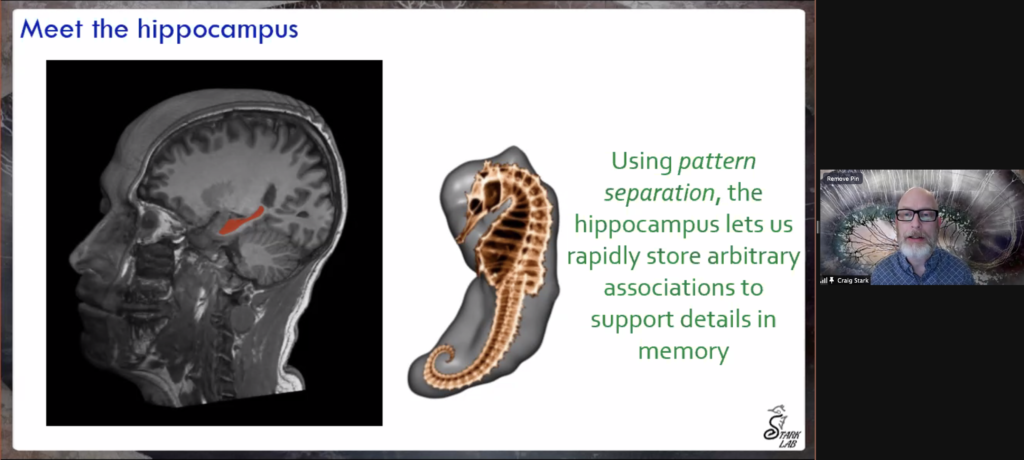
Professor Craig Stark introduces Brain Bee participants to the hippocampus during his keynote lecture.
Please explore the original infographics presented at the 2021 Virtual Brain Bee.

Jaclyn Beck
Jaclyn Beck received her M.S. in Computer Science from UW-Madison and is now a PhD student in neuroscience at UCI. She studies how the brain’s immune system plays a role in the development of Alzheimer’s disease. She is very interested in making science fun and educational for children and adults alike. She hopes that encouraging good communication between scientists and the general public will lead to a larger and more diverse group of scientists.

